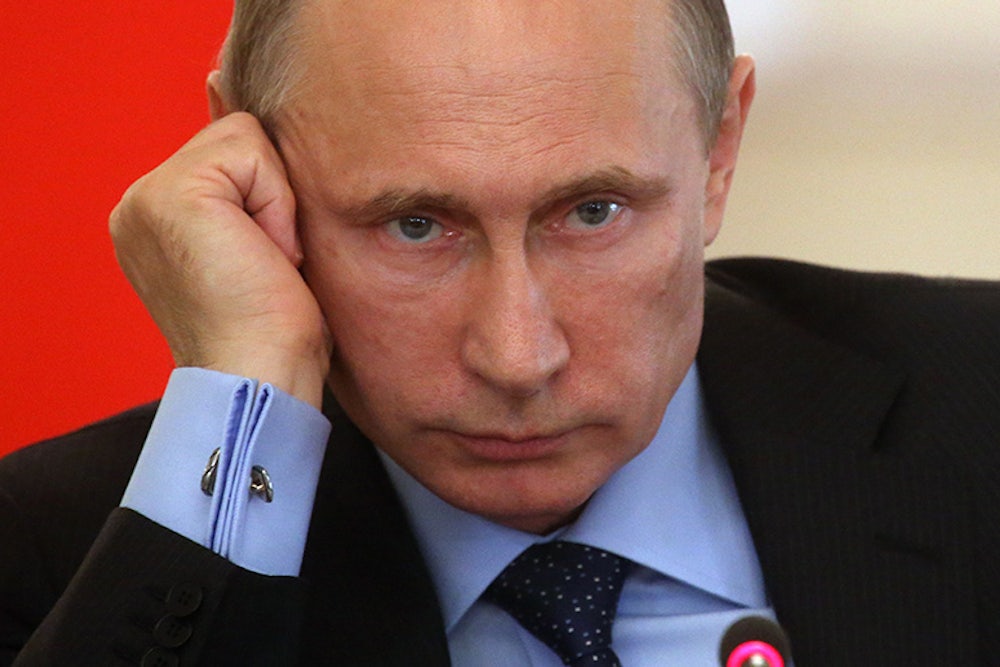Yesterday, Vladimir Putin announced that he was asking Russia’s upper house of parliament to revoke the government’s right to send troops into Ukraine—a right parliament had granted him on March 1. In a letter to Chairman of the Federation Council Valentina Matvienko, Putin declared that the decision was taken “in the aims of normalizing the circumstances and settling the situation in the Eastern regions of Ukraine.” Russian lawmakers approved the request today in a landslide vote of 153-to-1. Russian stock markets rallied at the news. The move has been lauded as a step towards peace in the region, or at least a major stride towards de-escalation.
Secretary of State John Kerry said that he was “delighted” with the news (before adding that, “this could be reversed in ten minutes”). Much of the delight has to do with anticipation surrounding the success of Ukrainian President Petro Poroshenko’s peace plan, as well as the relative inability of the West to effectively respond to a Russian invasion (which would still likely violate international law). Part of the upbeat response is likely also rooted in the fact that many companies with commercial interests in Russia would suffer damage to their business should sanctions go through.
Russia’s positive signals may not be so positive, however. According to Vedomosti, citing a source within the Russian Ministry of Defense, Putin retains the right to send Russian troops abroad. This is thanks to Dmitry Medvedev, who, as president in 2009, requested and received the right from the Russian upper house of parliament to send the army anywhere it pleases beyond Russian borders. According to the report, the Medvedev authorization was indefinite, meaning that Russia retains the legal right to send troops abroad in perpetuity.
The report essentially says that the status quo persists in Russian law with regard to invasion, despite Putin’s recent announcement. And while this may seem like an unimportant technicality, it means that all Putin has done is annul an extension of a right that had previously been granted, and which remains in effect to this day. So, even though much of the alleged Russian action in the region has been covert, his government can still openly send Russian troops into Ukraine without having to consult parliament again.
Putin’s meaningless gesture nevertheless comes at an opportune time. Western governments have recently threatened a volley of coordinated sanctions against Russia in order to rally support for Poroshenko’s peace plan. While EU sanctions have so far been limited to visa bans and asset freezes on specific individuals, the new sanctions would be stricter and could be announced as soon as this Friday at a meeting of the European Council in Brussels. However, thanks to the supposed annulment of the right to use force, the West might now delay imposing a new batch of sanctions that have been in the works for the past few weeks.
Other signs indicate Russia is more belligerent than its recent peaceful rhetoric suggests. Russia has redeployed more troops and artillery to the Ukrainian border in recent days, with U.S. officials alleging that special forces have arrived in order to arm and train pro-Russian separatists. And, after both sides declared a truce on Tuesday, separatist forces shot down a Ukrainian military helicopter, killing nine soldiers. The separatists who shot down the chopper may have been a rogue faction or generally unconnected to the Kremlin, but the equipment involved in recent attacks has been linked to Russian Special Forces.
Basically, nothing has changed from the beginning of this week, when Western officials were working together to launch coordinated sanctions. And while past reprimands have yet to show a meaningful impact on Russian policy in the region, it would be wrong to delay further sanctions when nothing substantial has changed.
As Western officials debate whether or not to prod and punish the Russian government, listening both to companies with commercial interests in Russia and to Putin himself, it is worth holding back. Rescinding the legal right to invade Ukraine has been the most publicized and largest conciliatory signal from Russia—it is empty.
